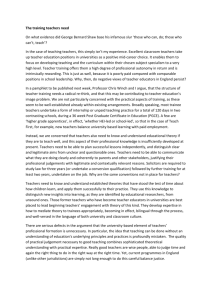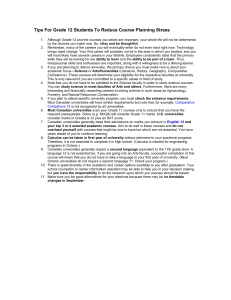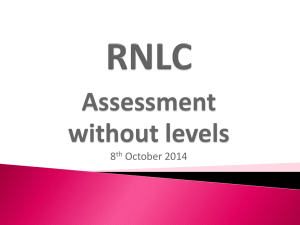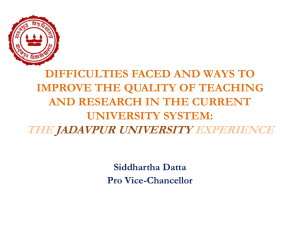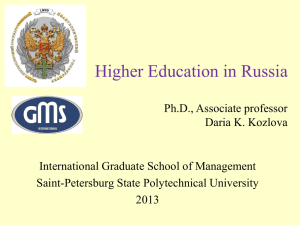Letter to MPs Dear Future of teacher education and high quality
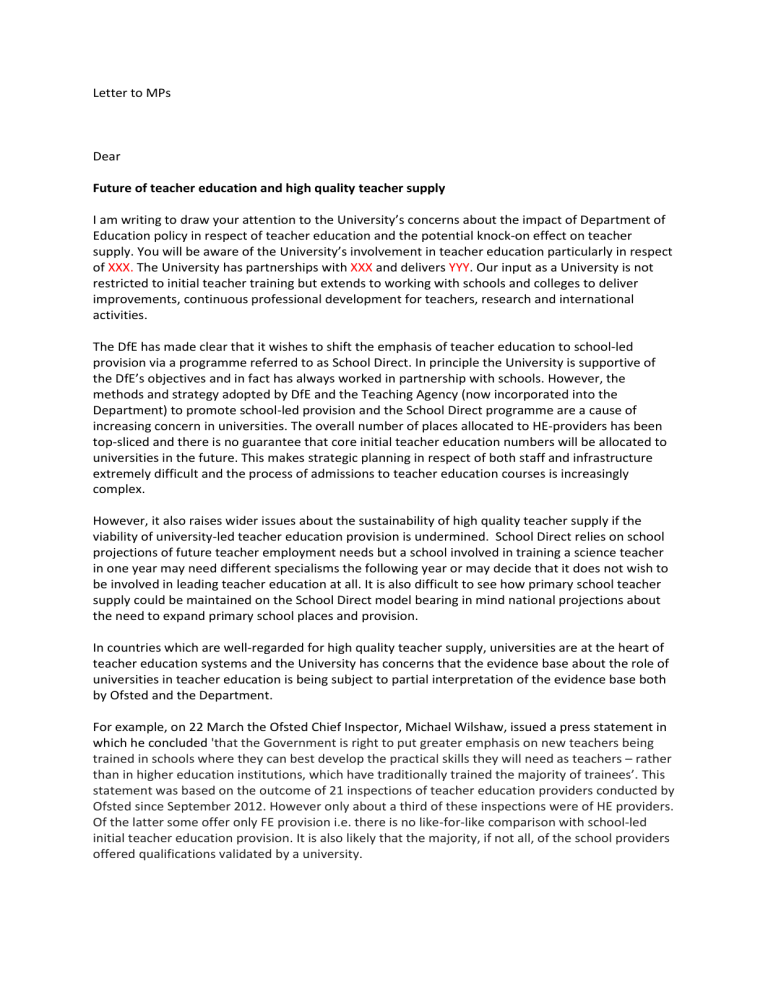
Letter to MPs
Dear
Future of teacher education and high quality teacher supply
I am writing to draw your attention to the University’s concerns about the impact of Department of
Education policy in respect of teacher education and the potential knock-on effect on teacher supply. You will be aware of the University’s involvement in teacher education particularly in respect of XXX.
The University has partnerships with XXX and delivers YYY . Our input as a University is not restricted to initial teacher training but extends to working with schools and colleges to deliver improvements, continuous professional development for teachers, research and international activities.
The DfE has made clear that it wishes to shift the emphasis of teacher education to school-led provision via a programme referred to as School Direct. In principle the University is supportive of the DfE’s objectives and in fact has always worked in partnership with schools. However, the methods and strategy adopted by DfE and the Teaching Agency (now incorporated into the
Department) to promote school-led provision and the School Direct programme are a cause of increasing concern in universities. The overall number of places allocated to HE-providers has been top-sliced and there is no guarantee that core initial teacher education numbers will be allocated to universities in the future. This makes strategic planning in respect of both staff and infrastructure extremely difficult and the process of admissions to teacher education courses is increasingly complex.
However, it also raises wider issues about the sustainability of high quality teacher supply if the viability of university-led teacher education provision is undermined. School Direct relies on school projections of future teacher employment needs but a school involved in training a science teacher in one year may need different specialisms the following year or may decide that it does not wish to be involved in leading teacher education at all. It is also difficult to see how primary school teacher supply could be maintained on the School Direct model bearing in mind national projections about the need to expand primary school places and provision.
In countries which are well-regarded for high quality teacher supply, universities are at the heart of teacher education systems and the University has concerns that the evidence base about the role of universities in teacher education is being subject to partial interpretation of the evidence base both by Ofsted and the Department.
For example, on 22 March the Ofsted Chief Inspector, Michael Wilshaw, issued a press statement in which he concluded 'that the Government is right to put greater emphasis on new teachers being trained in schools where they can best develop the practical skills they will need as teachers – rather than in higher education institutions, which have traditionally trained the majority of trainees’. This statement was based on the outcome of 21 inspections of teacher education providers conducted by
Ofsted since September 2012. However only about a third of these inspections were of HE providers.
Of the latter some offer only FE provision i.e. there is no like-for-like comparison with school-led initial teacher education provision. It is also likely that the majority, if not all, of the school providers offered qualifications validated by a university.
On the previous day (21 March) the Secretary of State announced that a further £10m was being awarded to promote School Direct. During his speech the DfE tweeted that ‘we need to move away from HEIs determining what should be happening in teacher training’. Again this does not accurately reflect the partnership relationship between universities and schools involved in teacher education.
The School Direct programme was supposed to be subject to review and an evaluation. To date no organisation has been appointed to undertake an independent review and no evaluation has been published. Separately you will be aware that Ministers have removed the requirement that teachers should have a professional qualification. This again sets England apart from other countries. Perhaps what is less well-known is that trainees who only gain Qualified Teacher Status (QTS) rather than a
PGCE do not have a portable qualification and will not be employed as teachers in Scotland or in
Wales (or in other countries).
Our concern is that the role that universities play in the delivery of teacher education is being inappropriately devalued and misrepresented. Moreover without any commitment by DfE or TA to allocate ITT numbers to universities in the short and long term, the viability of university-led teacher provision and the partnerships which currently deliver the majority of teacher education in England will be undermined. The Government would then be left with school-led provision that is highly unlikely to deliver sustainable, high quality teacher supply across all subject disciplines and for primary and secondary provision, in urban and rural areas, on the national and regional scale required.
I should be grateful if you would consider and advise how you might raise these concerns with
Ministers and in Parliament.
Yours sincerely
Vice-Chancellor
